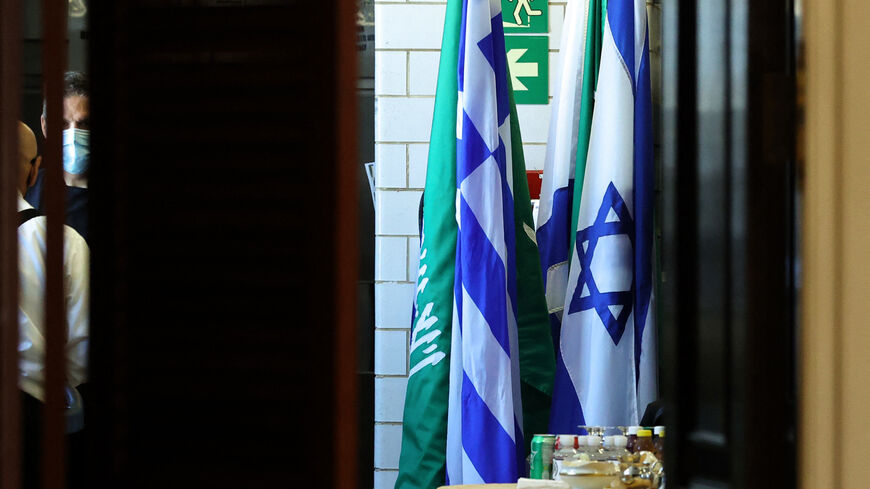TEL AVIV — Israeli Energy Minister Israel Katz expressed on Monday reservations about Saudi Arabia’s plans to establish a US-backed nuclear power program, in a first public statement on the issue by a senior Israeli official.
Katz made this statement as US Secretary of State Antony Blinken was preparing to fly to Saudi Arabia for talks expected to include discussions of the nuclear program for which the Saudis are seeking US technology and know-how.
“Naturally, Israel does not encourage such things. I don't think Israel should agree to such things, but there are contacts underway," Katz told Ynet TV when asked about Israel’s stance on the Saudi demands that the US green-lights the nuclear program as a condition for the kingdom’s normalization of relations with Israel.
As mentioned, the remarks by the veteran politician, a member of the ministerial security Cabinet, were the first public Israeli comments on the Saudi condition since it was first reported earlier this year. In a clear link between prospects of peace with the Saudis and an Israeli OK for the Saudi program, Katz added, “normalization with Saudi Arabia is important and I also hope we will have a peace agreement.”
Blinken echoed this sentiment. "The United States has a real national security interest in promoting normalization between Israel and Saudi Arabia," Blinken said in a speech to the pro-Israel AIPAC lobby in Washington. "We believe we can and indeed we must play an integral role in advancing it."
Katz’s comments appear to serve as a trial balloon for the position of some within Prime Minister Benjamin Netanyahu’s circle, who do not rule out such a deal. But they also prompted harsh objections.
“What he said was not an official position,” a senior diplomatic source told Al-Monitor on condition of anonymity. “The fact is that Israel has still not formulated a clear position on the Saudi nuclear issue. Katz’s remark will stir up a lot of noise behind the scenes. There are pros and cons, but Israel is far from arriving at a final position and there are powerful elements that oppose this option, while some around the prime minister do not reject it out of hand.”
The diplomatic source emphasized that this is a strategic issue “that must be decided on the basis of deep-rooted considerations and discussions. The truth is that we do not have to make a decision on this issue because the deal with Saudi Arabia is in its infancy and the prospects of it maturing are far lower than its prospects of going through.”
Another diplomatic source, who has been familiar with Israeli-American relations for years, told Al-Monitor on condition of anonymity, "Israel will align itself with the US Congress. There's no reason not to. Congress will present the Saudis with difficult demands. If the Saudis want the nuclear issue to be approved by Congress — and it must be approved there — they will have to comply with its terms. Not sure it's possible."
"There is no chance that Congress will approve a move that will allow the Saudis to enrich uranium on their own — on Saudi soil. This could be a deal breaker because the Saudis cannot agree to a lower status than Iran, which enriches uranium 'at home.'" Saudi Crown Prince Mohammed bin Salman “will not humiliate himself. … He wants the same status as the Iranians, and that won't be approved by Congress," the source noted.
The kingdom’s energy minister, Prince Abdulaziz bin Salman, told a mining conference in Riyadh Jan. 11 that his country plans to enrich its domestic uranium stocks to ensure its ability to complete “the entire nuclear fuel cycle.”
The need for congressional approval begs the question of whether Netanyahu will seek to harness the position of the powerful American Israel Public Affairs Committee (AIPAC) lobby and Israel's influence, which is still considered significant on the Hill, to advance the Saudi move.
"At the moment, it's impossible to know," a political source in Jerusalem told Al-Monitor on condition of anonymity, "because the deal isn't here yet. Other possibilities arise, according to which Israel will agree to 'swallow' a new nuclear agreement between the US and Iran, and in return, the US will agree to go a long way toward the Saudis in order to normalize relations with Israel. It doesn't solve all the issues yet, but it's significant. Can Netanyahu go along with such a move? At the moment, no one knows. Apparently, neither does Netanyahu."
The Israeli defense establishment is not enthusiastic, to say the least, about Saudi access to nuclear energy, let alone uranium enrichment on its soil.
"We have been saying for years that a nuclear program in Iran will expose the entire Middle East to a nuclear arms race. This is no different in the Saudi case. With the Iranians enriching uranium to military grade and the Saudis on their way to doing so, there is no doubt that within a short time we will see progress toward nuclear weapons in Egypt, the Gulf and elsewhere as well. There is no vacuum on such a strategic issue, certainly not in the Middle East," said an Israeli security official, speaking on condition of anonymity.
In the meantime, however, no dramatic progress has been made on the Israeli-Saudi track. Addressing a Senate panel on May 31, Assistant Secretary of State for Near Eastern Affairs Barbara Leaf downplayed recent reports indicating that Israel and Saudi Arabia are close to reaching a normalization agreement. In his address to AIPAC, Blinken, too, stressed that such a process would take time. On the other hand, he reiterated the US commitment to the two-state solution, which the Saudis support, an issue that has all but disappeared from the regional agenda.
Netanyahu, for his part, said in a Channel 14 interview on June 5 that "agreements with Iran ultimately have no practical value; we are determined to do everything to stop Iran from acquiring nuclear weapons."
Those listening closely no doubt noticed that, contrary to his habit, Netanyahu did not launch a diatribe against a possible new agreement between Iran and the United States reported in recent days. He did not claim that it posed a danger and that it would turn Iran into a nuclear power, which he said about previous reports of a deal in the making with Tehran. He contented himself with dismissing deals with Iran as having “no real value." This is a significant moderation in Netanyahu's rhetoric. Does it indicate a shift in direction? With Netanyahu, one never knows.








